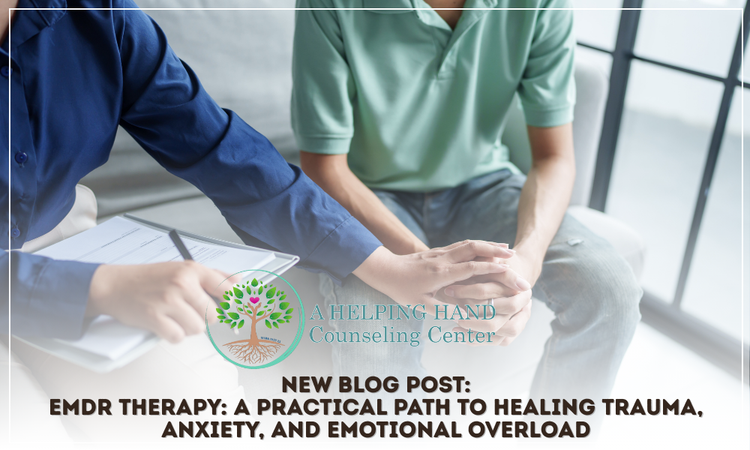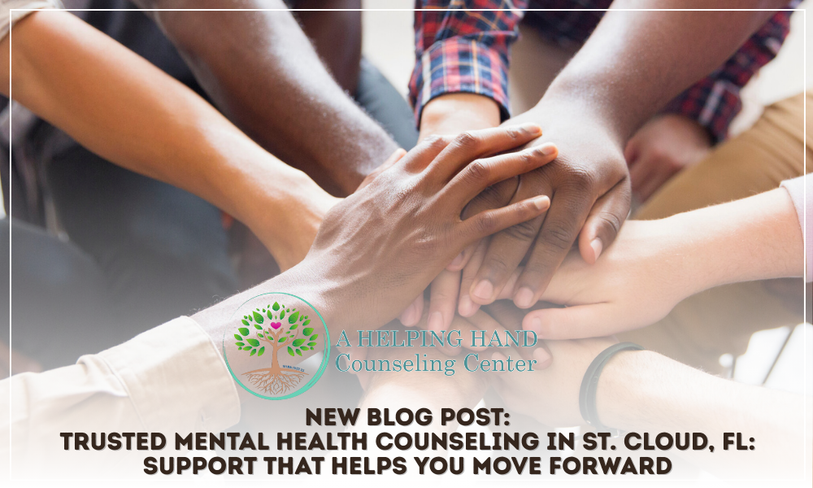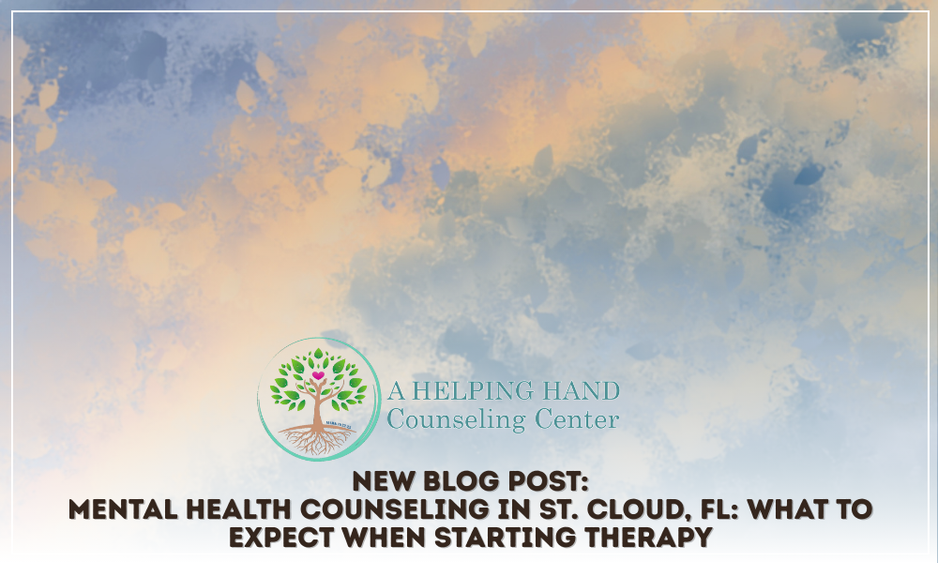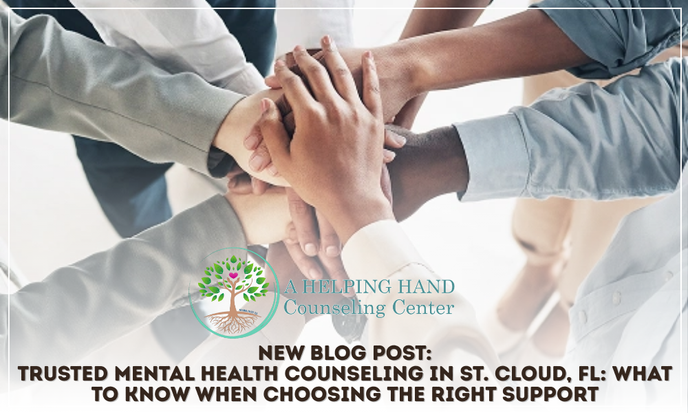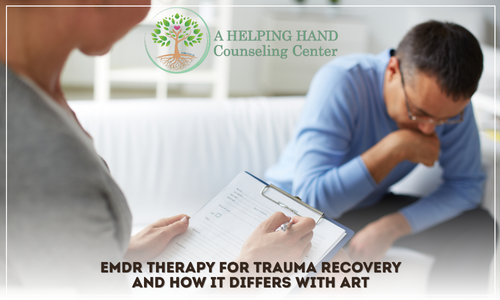
Healing Trauma Through Emdr Therapy how The Brain Finds Its Way Back To Calm
Trauma doesn’t always look like what we see in movies.
It can come from a car accident, a painful breakup, an illness, or years of quiet emotional strain. Sometimes, it’s a single event; other times, it’s layers of experiences that slowly shape how we see ourselves and the world.
No matter where it starts, trauma leaves a mark. But here’s the hopeful truth — the brain is built to heal.
At A Helping Hand Counseling Center, we use a proven approach calledEMDR therapy (Eye Movement Desensitization and Reprocessing)to help individuals reprocess painful memories and move forward with peace, strength, and renewed confidence.
What Is EMDR Therapy?
EMDR (Eye Movement Desensitization and Reprocessing) is a clinically validated therapy designed to help people recover from distressing life experiences, including trauma, anxiety, grief, and loss.
Instead of retelling every painful detail, EMDR helps your brain process those memories so they no longer trigger intense emotions, flashbacks, or body reactions.
It’s not hypnosis — it’s the brain doing what it naturally does when it’s supported in the right way.
How EMDR Therapy Works: Bilateral Stimulation for Trauma RecoveryHow EMDR Works
When we experience trauma, our brains can become “stuck.” The memory doesn’t fully process, so it stays active — triggering the same emotional and physical reactions long after the event is over.
EMDR uses bilateral stimulation (like side-to-side eye movements, tapping, or sounds) to engage both hemispheres of the brain while focusing on a targeted memory.
Here’s what happens in an EMDR session:
The therapist helps you identify a memory or issue that’s causing distress.
You recall the memory while focusing on gentle eye movements or tapping patterns.
The brain begins to reprocess the event — connecting it to logic, safety, and present-moment awareness.
Over time, the emotional “charge” attached to the memory fades, replaced by a sense of relief and balance.
Clients often say it feels like “the memory is still there — but it doesn’t hurt anymore.”
Why EMDR Is So Effective for Trauma
Unlike traditional talk therapy, EMDR doesn’t rely solely on words. It activates the brain’s natural healing mechanisms, addressing how memories are stored — not just how we think about them.
EMDR helps:
Reduce flashbacks, nightmares, and intrusive thoughts
Calm the body’s stress response (fight, flight, or freeze)
Rebuild a sense of safety and control
Restore confidence, focus, and emotional stability
Improve sleep, mood, and daily functioning
Research from the American Psychological Association and the World Health Organization supports EMDR as one of the most effective trauma treatments available today.
Types of Trauma EMDR Can Help With
Trauma isn’t one-size-fits-all — and neither is healing. EMDR is used successfully for:
PTSD (Post-Traumatic Stress Disorder)
Childhood neglect or abuse
Anxiety and panic attacks
Grief and loss
Depression linked to past trauma
Medical or accident-related trauma
Relationship trauma or betrayal
First responder and veteran stress
Even people who don’t identify their experiences as “trauma” often find EMDR helpful for long-standing emotional distress, fear, or guilt.
What to Expect in EMDR Therapy
At A Helping Hand Counseling Center, EMDR therapy starts with trust and collaboration. Your therapist will walk you through every step so you always feel grounded and supported.
A typical EMDR process includes:
Assessment: Discussing your history, symptoms, and goals
Preparation: Learning relaxation and grounding skills
Processing: Guided EMDR sessions using bilateral stimulation
Reintegration: Reflecting on progress and applying insights to daily life
Sessions are structured yet flexible. Many clients begin to notice shifts in emotion, sleep, or perspective within a few weeks.
The Connection Between EMDR and the Body
Trauma doesn’t live only in the mind — it’s stored in the body, too.
That’s why EMDR can help relieve physical symptoms like muscle tension, headaches, or racing heartbeats tied to emotional memories.
By calming the nervous system, EMDR promotes whole-body healing — helping you feel more grounded, centered, and connected to the present.
Faith, Healing, and Emotional Recovery
At A Helping Hand Counseling Center, we recognize that healing can be emotional, physical, and spiritual.
Our therapists integrate compassion and respect for faith and values into therapy for those who wish to include it.
This holistic approach helps clients rebuild trust not just in themselves, but in life itself.
When Should You Consider EMDR?
You may benefit from EMDR therapy if you:
Feel “stuck” revisiting the same painful experiences
Have difficulty trusting others or feeling safe
Avoid places, conversations, or reminders of the past
Experience physical reactions to emotional memories
Want to move forward but feel held back by fear or guilt
If any of this sounds familiar, EMDR could be the breakthrough you’ve been waiting for.
EMDR vs. ART — What’s the Difference?
At A Helping Hand Counseling Center, we also offer Accelerated Resolution Therapy (ART), another evidence-based trauma treatment.
While both EMDR and ART focus on reprocessing distressing memories, ART tends to use guided imagery and visualization, often producing results in fewer sessions.
EMDR, on the other hand, follows a more structured eight-phase protocol and is ideal for clients who want to work through complex or layered trauma histories.
Our trained clinicians can help you determine which method best fits your needs.
Start Your Healing Journey Today
If trauma has been shaping your life for too long, it’s time to take the first step toward healing.
Our EMDR-trained therapists are here to help you process the past safely and rediscover your peace of mind.
Call (407) 450-5985 or visit ahhcounseling.com to schedule your consultation.
You don’t have to carry the weight of the past alone — together, we can help your mind and body heal.
A Helping Hand Counseling Center
- 303 Commerce Center Drive St. Cloud, FL 34769
- teamcare@ahhcounseling.com
- (407) 450-5985
- www.ahhcounseling.com
Subscribe to Our Newsletter
Posts Category
Most Popular Posts
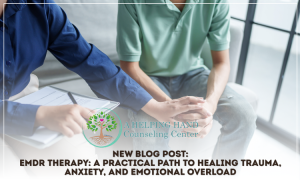
EMDR Therapy: A Practical Path to Healing Trauma, Anxiety, and Emotional Overload
If you’ve tried traditional talk therapy and still feel stuck, overwhelmed, or emotionally triggered, you’re not alone. Many people in St. Cloud, FL seek mental

Your Local Mental Health Counseling Clinic – Support That Helps You Move Forward
Finding the right mental health support is a deeply personal decision. Whether you’re navigating relationship challenges, trauma or emotional overwhelm, having a trusted local mental
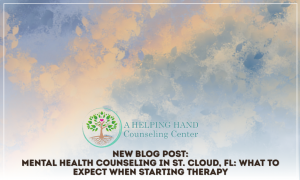
Mental Health Counseling in St. Cloud, FL: What to Expect When Starting Therapy
Starting mental health counseling can feel overwhelming, especially if you’re unsure what the process looks like or whether therapy is right for you. For individuals
Subscribe to Our Newsletter


